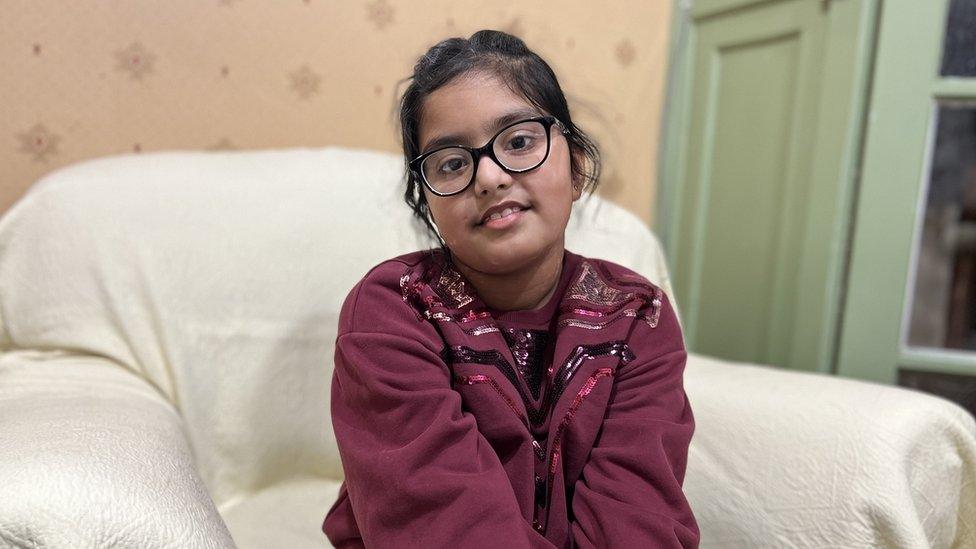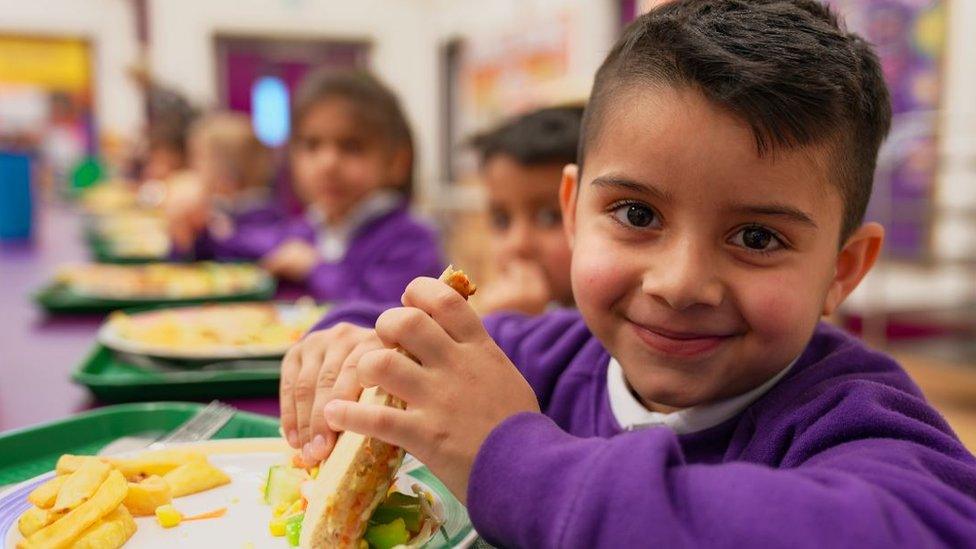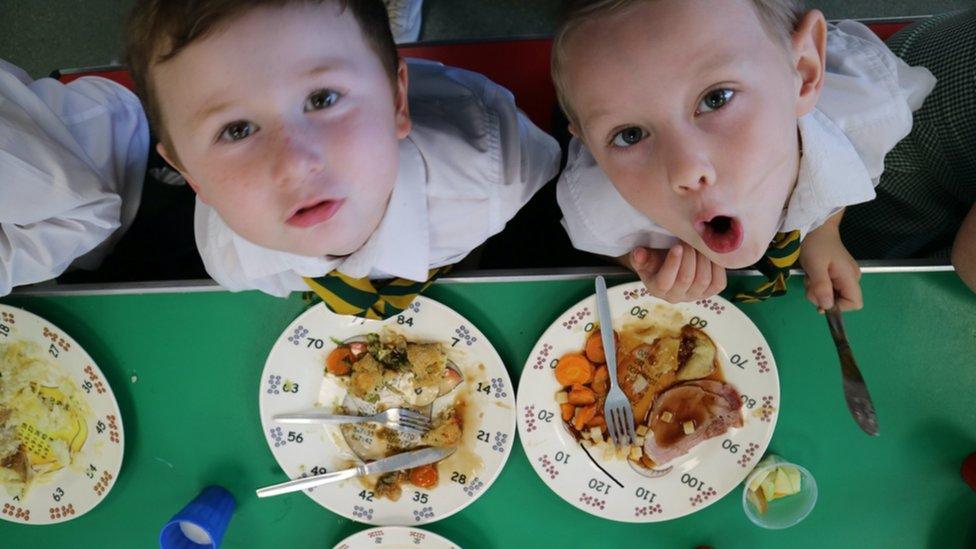'We can only buy one £2.10 school meal a week for our daughter'
- Published

Alishah does not qualify for free school meals, and her parents are struggling to cover the cost of her lunches
Children need nourishing school dinners more than ever before, as many families struggle with the cost of living, a leading expert has warned. BBC News has been speaking to families and schools as they try to tackle the problem.
The Raza family - dad Ali, mum Simran and their eight-year-old daughter, Alishah - live in one of Bradford's back-to-back, two-up-two-down terraced houses.
The heating is off upstairs to help manage rising bills and Ali tells me: "We're just managing, and not very well."
Ali is a self-employed wholesaler. He mainly buys fruit and vegetables in bulk before selling them on - but there is a limit to what small local shops are prepared to pay, so as costs rise his profits decrease.
Against a wall downstairs are stacked multipacks of toilet roll, from which he expects to make only 20p each - even less after petrol costs - while the cost of the family's weekly grocery shop has almost doubled.
"It's not just an increase in one or two items, it's every single thing," Ali says.
It means they can only afford to buy school lunch for Alishah once, or sometimes twice, a week. Each meal at her school, Dixons Marchbank Primary, costs £2.10.
Prof Susan Jebb, the chairwoman of the Food Standards Agency (FSA), is also a leading expert on nutrition. Speaking exclusively to the BBC, she said it was crucial right now that parents were confident the school lunch was worth the money.
"I am worried that the cost-of-living crisis risks turning into a public health crisis," Prof Jebb said.
"There is an opportunity in schools to at least protect children from the worst of that by ensuring that the food they have in schools is healthy and nutritious."
Not eligible for free school meals
All state school pupils in Reception, Year 1 and Year 2 can have free school meals during term time in England, but only the very lowest income families get free school meals for older children. As Alishah is in Year 3, her parents must pay.
As Simran prepares pasta and a salad for Alishah's evening meal, she says she wishes they could afford more frequent school lunches, as sometimes Alishah does not eat her packed lunch of cold leftovers.
Alishah always has a hot school lunch on a Friday - pizza and chips day at Dixons.
The school meticulously keeps to the national school food standards, which for example, say deep-fried food should not be served more than twice a week.
School principal Helen Haunch is on duty at the lunchtime salad bar to coax pupils into trying at least one vegetable they like alongside their pizza.
Most children here have school lunch at least some of the week, but some families are switching more to lunchboxes to save money.
While most parents try to stick to the school advice on what should be included in a healthy packed lunch, Mrs Haunch said they see others struggling.
"What we often see is leftover burgers or cold food coming from restaurants that are in the lunchboxes the next day, which is not always balanced with the things we would like to see, such as yoghurts and cheese and fruit."

Dixons Marchbank Primary says it works hard to provide nutritious school meals within the national standards
It is more than 10 years since scandals over highly-processed fast food on school menus led to limits on unhealthy food, with national standards introduced in England.
Now for the first time, 18 councils - including Bradford - are working with the FSA to try out a system of checking on school meals.
In regular FSA surveys, 30% of adults report missing a meal, or eating less because of cost, up from 22% in March. Some are also turning off their fridges to save money.
This all suggests families have less to spend on food at home, making school meals all the more crucial for children.
The pilot scheme of checks, promised in the government's Levelling Up plans earlier this year, will involve using the existing hygiene inspections of school kitchens.
It is more important than ever to know this important safety net for children is working, Prof Jebb said.
'Heart-breaking'
Dixons receives a delivery of donated food, some vegetables just past sell-by dates, each Tuesday.
It is set out on a table in the playground at pick-up time, and parents can take what they need, while donating what they can manage.
"There are families still who can't even still manage those couple of pounds," Sameera Khan, who works with the schools' parents, says.
This year she has already referred more families than usual to the local food bank, saying it is "heartbreaking" to see families struggle.
"I do have parents asking if their child can have free school meals, but we have to say it's not up to us."
Additional reporting by Sallie George.

Have you been affected by the issues raised in this story? Share your experiences by emailing haveyoursay@bbc.co.uk, external.
Please include a contact number if you are willing to speak to a BBC journalist. You can also get in touch in the following ways:
WhatsApp: +44 7756 165803
Tweet: @BBC_HaveYourSay, external
Please read our terms & conditions and privacy policy
If you are reading this page and can't see the form you will need to visit the mobile version of the BBC website to submit your question or comment or you can email us at HaveYourSay@bbc.co.uk, external. Please include your name, age and location with any submission.
Related topics
- Published4 July 2022

- Published21 October 2022

- Published16 November 2022
